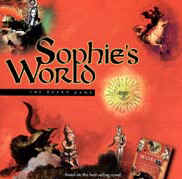
Good, but with some major flaws. Worth a read. | ||
| Format: Fiction | Genre: Unique | Published: 1995 |
| Summary: Sophie, a young Norwegian girl, begins receiving strange letters. As she pursues the mystery, she is swept up in a study of the history of Western philosophy. | ||
Sophie's World is a curious book. It is, at its core, a much-simplified but well-written exposition of the history of Western philosophy, covering many of the major thinkers and providing capsule summaries of their major thoughts. But such a description fails to capture all the tricks that Gaarder pulls with this book, for Sophie's World is also a book within a book within a book, a meditation on the free will of fictional characters, a mystery, and a political manifesto. Unfortunately, I can't really say that I liked Gaarder's tricks too much; however, the strength of the "philosophy lectures" deservedly earned my respect.
The book begins with some pretty vapid observations, a disappointing start for a novel that is supposed to seriously chart the progress of philosophy. At one point early in the book Gaarder writes:
"You can't experience being alive without realizing that you have to die, she thought. But it's just as impossible to realize you have to die without thinking how incredibly amazing it is to be alive."In itself this isn't such a bad sentiment (Lewis Thomas expressed a similar view in one of his remarkable essays), but it has the feel of a Hallmark moment, with all the saccharine and artificiality that that term implies. Things get a little better when Gaarder begins on classical philosophy. Although he passes extremely quickly over most of it, Gaarder spends plenty of time on Plato and Aristotle with several succinct sections on their philosophies.
The book really starts picking up when it starts discussing Descartes. Gaarder presents an excellent overview of Descartes's major thoughts, including his "Cogito ergo sum" and his epistemology (both of which I've studied). Naturally there's nothing particularly deep here, but Gaarder gives us enough to understand the core of Descartes's basic beliefs.
The philosophy just keeps getting better from this point onward. Gaarder does an amazing job with Kant, although my familiarity with some of his thoughts probably helped me navigate through the many, many points that Gaarder brings up about that amazing man. He also explicates well the central concepts of empiricism and Marxism. The sections that I thought were weaker involved Romanticism and Existentialism. Finally, Gaarder unleashes a truly delicious attack on the New Age phenomena that also doubles as a defense of Western philosophy as an appropriate field of study (despite being written by dead white males).
The chief strength of Gaarder's presentation of philosophy is his ability to draw connections between the different philosophers. So, for instance, Gaarder will trace a line of thought that begins with Aristotle and journeys through Aquinas and many of the more modern philosophers, or he will show that the Existentialists are concerned with issues that the early Christian theologists were also concerned with. In doing so, Gaarder showcases philosophy as a process, one that builds off previous ideas and presents new ones on top of them. Suddenly Marx begins to make sense against his Hegelian background, Simon de Beauvoir starts sounding reasonable against her Existentialist background, and Aquinas's project becomes clear, especially in relation to the Church's relationship to history at the time. Gaarder also provides ample space for Eastern philosophy, pointing out, for example, the parallels between the Buddha and (of all people) David Hume.
One problem that I had with Gaarder's presentation of philosophy, however, is the inordinate amount of time he spends talking about women, women's issues, and women's place in philosophy. While I agree with everything he writes, he spends entirely too much of the book having Sophie object violently to some anti-femininist philosopher, and he takes pains to point out what each philosopher thinks about women. Rather than going off about women, I would rather have had Gaarder spend a little more time exploring an interesting aspect of the philosopher's thinking.
What about the book's non-philosophical sections? Too be honest, I thought the narrative in which Gaarder's lessons are given was pretty dumb. For most of the book I just breezed through the narrative, looking for the next chapter heading that would let me know that some real philosophy was about to take place. I think I understand the point that Gaarder is making with the narrative--it's hard not to, after all--but spending upwards of a quarter of the book on it is really a waste of time. And the point he's making, with all of its meta-implications, is not that exciting anyway. I suppose tastes will differ, but for my part I thought the only parts of Sophie's World worth reading were the philosophy bits.
I do have this to say in favor of the narrative, however: although the style of the book is deceptively simple, almost like a children's book, Gaarder intentionally puts in little disturbing details that make it clear that Sophie is not living in a perfect world. Sophie's father is away several months a year and her mother may have a boyfriend; Joanna's father is a greedy capitalist and her mother a trophy wife; and Sophie doesn't exactly have the best relationship with her own mother. Aside from the philosophy, I thought these blemishes were the most interesting parts of Sophie's world, but ultimately I felt that they served only as distractions to the real meat of this otherwise engrossing book.
Copyright © 2002 Steven Wu

















